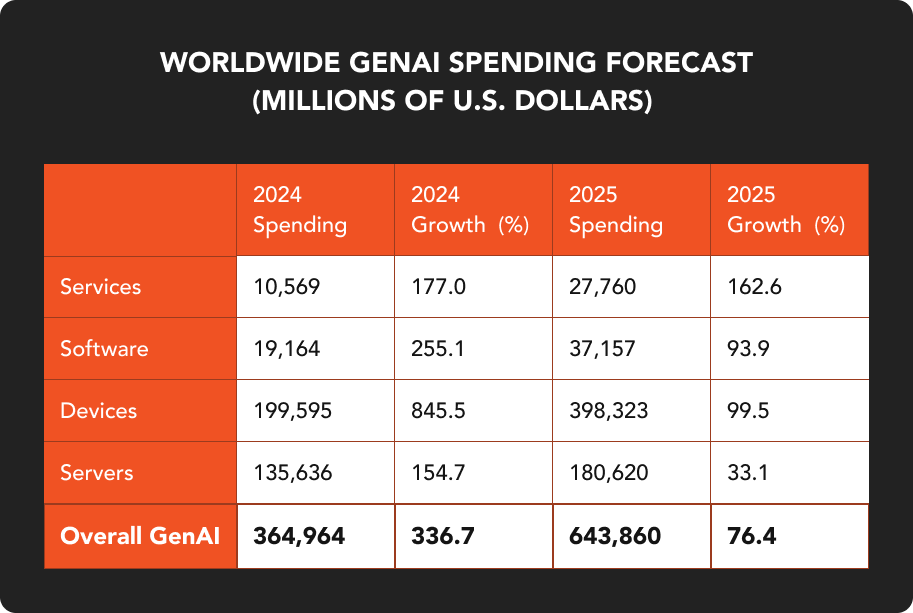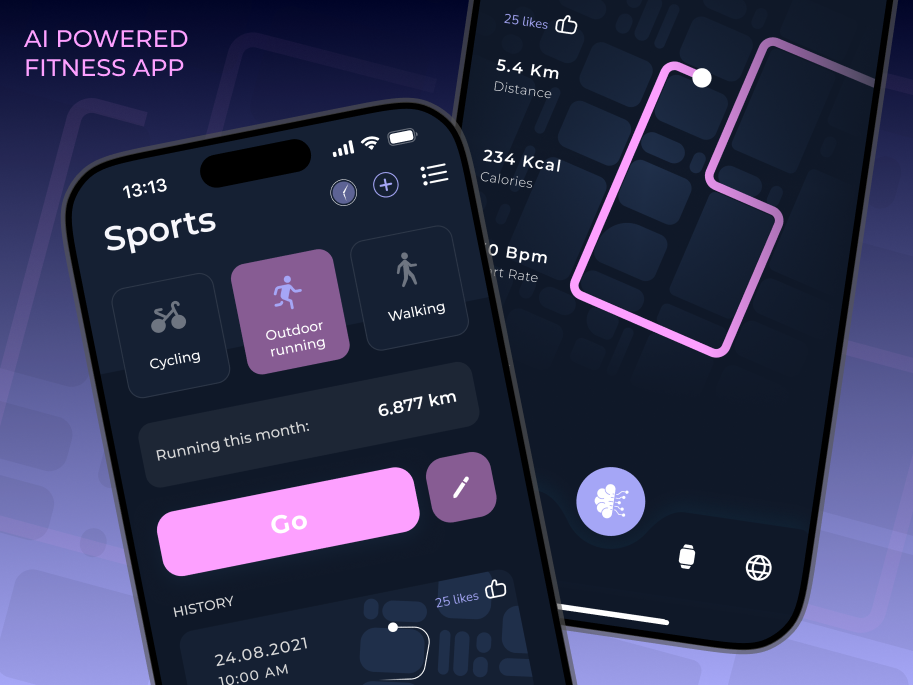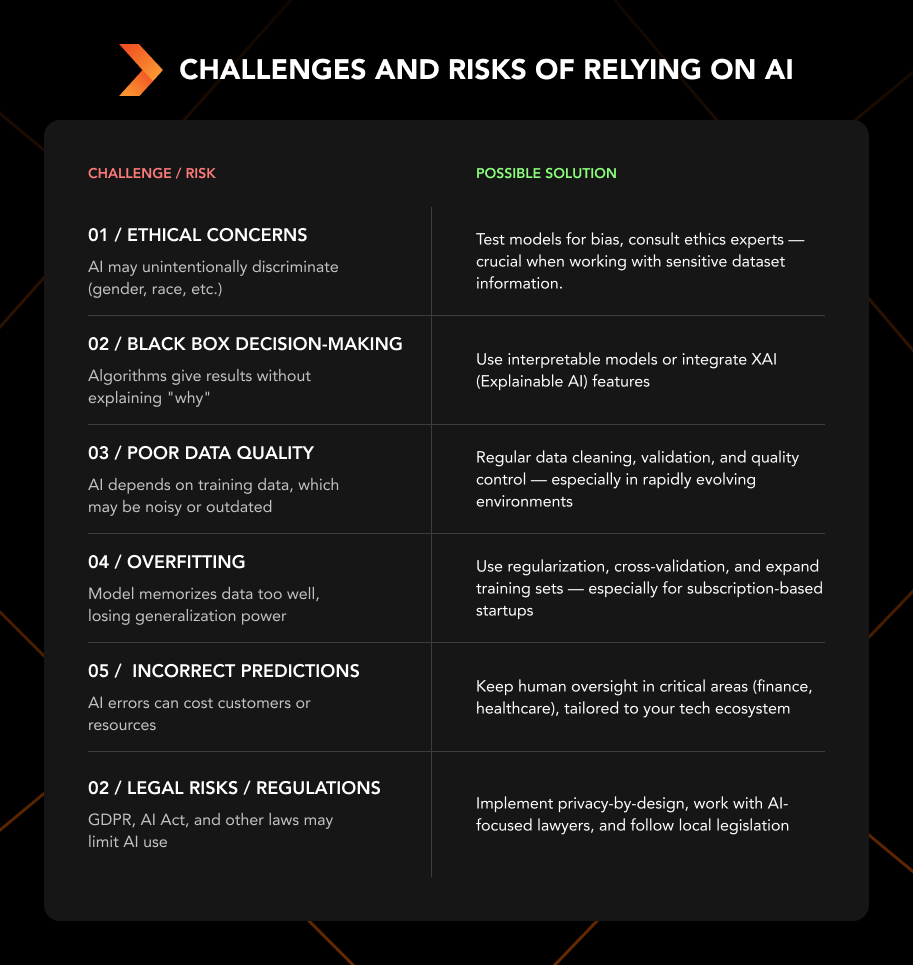"Implementing AI is too complicated"
"We can't afford it"
"Our product is an exception. These solutions won’t work for us"
Sounds familiar? Perhaps you’re among those who hold such beliefs. Or maybe you understand the importance of AI for startups, but find yourself stuck at the implementation stage.
Either way, this article will help debunk popular myths about adopting AI tools. We’ll break down how businesses can:
- choose AI tools that deliver immediate results;
- avoid common pitfalls during implementation;
- overcome technological barriers;
- achieve all of this without unnecessary costs.
Your startup can grow 10x faster when it starts speaking the AI language. No million-dollar investments. No complicated setups.
How AI Is Reshaping the Startup Landscape
Gartner predicts that by 2027, 50% of startups in the tech sector will use AI as a core component of their business model. Interestingly, up to 80% of the costs won’t go toward the AI-driven solutions themselves, but toward hardware.

CIOs should prepare accordingly. The AI market, along with the demand for large language models, will continue to grow. Global spending on generative artificial intelligence is expected to reach $644 billion in 2025 — a 76.4% increase from the previous year, according to leading research firms.
It’s crucial to recognize that today, artificial intelligence allows startups not just to automate processes, it transforms the very structure of business models.
You'll need AI to:
- personalize offers and predict customer desires;
- improve service (via chatbots and predictive algorithms);
- perform predictive analytics (especially critical for fintech and healthcare);
- automate supply chains and logistics;
- enable content creation and marketing campaigns.
In general, the AI toolkit is becoming so powerful that it’s ready to meet even specific needs. Let’s dive deeper into the capabilities.
Types of AI Tools for Startups
AI tools for startups help you solve real business problems. Whether it’s automation, productivity, adding value, analytics, scaling, or improving collaboration or something more niche (like dealing with underperforming team members).

Moreover, artificial intelligence for startups is useful at every stage: from idea generation to global market expansion. Let’s look at some common use cases.
AI as an Assistant in Startup Creation
AI tools free your team from routine processes and can save up to 12 hours per week, eliminating repetitive tasks.
Every new business faces limited resources: time, people, finances. That’s why automating repetitive tasks becomes a lifesaver, helping to close those gaps.
Here are a few AI tools for startups that can help. Some of these tools can be part of the product development process, while others can help you tackle business and marketing tasks. We’ll also share how our team uses the power of artificial intelligence in practice.
Tasks like data entry, meeting scheduling, file organization:
- Notion AI — automatically structures notes, summaries, and spreadsheets, offering quick overviews and to-do lists.
- Motion — uses AI to build schedules based on priority and urgency.
- Otter.ai — transcribes voice notes, creates meeting reports, and integrates them into storage systems.
These tools can significantly accelerate workflows. At Embrox, we use them in our development cycle to make our team more productive, reduce risks, and help us deliver projects for our clients faster and with higher quality.
Data analysis: market trends, user behavior
Make data-driven decisions, not just intuitive ones:
- Tableau (AI features) — visualizes market trends and offers automated business insights.
- Google Cloud AI — analyzes user behavior in real time, spotting anomalies and new patterns.
In one of our projects, we integrated Google Cloud AI to analyze user data in real time, this allowed us not only to improve the user experience, but also to predict user behavior, making the product more adaptive and effective.
Workflow automation
Run near-autonomous projects that once required manual oversight:
- ClickUp AI — analyzes your tasks, deadlines, priorities, and work habits, then recommends an optimized workflow.
- Asana AI — helps form and prioritize tasks based on urgency, dependencies, and team resources. Sometimes we optimize workflows using Asana AI, which is especially important when working on large-scale projects that require synchronization across multiple teams.
AI as an Integral Part of a Startup
Another important aspect of how to use AI in business startups is to adapt content, features, and UX to individual customer needs. This boosts engagement, reduces churn, and accelerates growth.
How does it work? AI analyzes behavior (views, clicks, time spent in-app) and adjusts the interface to user habits. For example:
- Netflix recommends movies based on viewing history — saving up to $1 billion annually by improving retention.
- Duolingo adjusts lesson difficulty when users make repeated errors — boosting learning efficiency by 30% on average.
We also actively implement advanced AI solutions for our clients to personalize and adapt their products based on user behavior increasing engagement and satisfaction.
For example, in the e-commerce space, we use AI to generate dynamic product recommendations by analyzing purchase history and search queries. This helps optimize product offerings in real time, improving the user experience and boosting conversions.
For mobile apps and SaaS products, we integrate machine learning systems that analyze user behavior, habits, and preferences, automatically adjusting content, interface, and functionality. In a fitness app (see case below), for instance, we can configure personalized workout programs or nutrition tips based on users’ actions and preferences.
AI is also the heart of many products:
- In smart devices (e.g. thermostats, watches, appliances), cutting-edge technology enables behavior-based automation. Fitness trackers, for instance, use artificial intelligence to analyze sleep and effort, offering personalized training.
- In chatbots and virtual assistants, AI understands context by learning from past conversations and suggests relevant solutions.
- In diagnostic systems (medical or technical), fine-tuned AI processes sensor data or images and improves accuracy with every iteration.
The result is a feedback loop:
User interacts → AI analyzes behavior → algorithms adapt the product (interface, recommendations, functionality) → user experiences improvement → cycle restarts.
Thus, AI tools for startups help continuously enhance products, scale operations, stay relevant, and reduce churn.
AI-Powered Tools for growing business
Overall, artificial intelligence for startups can speed up processes and boost efficiency across all key business areas:
1. Pitch and presentation creation. Use Beautiful.ai or Tome to auto-generate slide designs, visuals, and structure based on content. For medical startups seeking HealthTech investment, try Upheal.
We use these tools to create presentations in the early stages of development. This allows us to quickly build modern, visually appealing decks while saving the team time and effort.
2. Funding prediction and investor targeting. Tools like Float analyze expenses and revenue, flagging cash gaps. SignalFire scans venture deals to find investors in your niche. Kira Systems automates contract and report reviews to speed up negotiations.
We consult clients on integrating budget forecasting and investor targeting systems helping accelerate fundraising efforts and optimize financial planning.
3. Prototyping. Uizard turns hand-drawn sketches into clickable prototypes within minutes. Figma AI suggests design layouts, fonts, and colors. Integrating rapid prototyping tools into your project can be a great way to reduce time-to-market and save on budget.
4. QA testing. Use software auto-testing tools like Testim or Functionize. They help our QA team detect up to 85% of bugs without manual intervention — significantly speeding up the quality assurance process. While they don’t replace human expertise, they are a powerful tool that complements and enhances our testers’ work.
5. Copywriting and SEO. For projects that require content creation or SEO optimization, tools like Jasper, Copy.ai can be integrated to quickly generate texts tailored to business needs ensuring high customer engagement with minimal effort.
6. CRM/marketing. We can recommend AI-powered tools for marketing and CRM as part of our clients’ projects when they align with business goals, budget, or other project requirements. For example, HubSpot AI can help predict the most promising leads, while Mailchimp enables the creation of segmented email campaigns — allowing clients to manage their marketing more effectively and improve ROI.
7. Operations. Need to predict taxes or categorize expenses? Use QuickBooks AI. To manage global hiring and payroll with local compliance, try Deel or Rippling. We can API-connect these systems to your product post-launch.
8. Customer support. Chatbots (like GPT-5 or Zendesk Answer Bot) can handle up to 60% of customer queries without an agent. Voice assistants (e.g. Google Contact Center AI) detect customer emotions and escalate calls when needed. We implement such bots only after thorough training with your product knowledge base.
Real-World Example: AI-Driven Fitness App by Embrox

Even in the crowded fitness app space, we created unique value:
- Personalization → higher loyalty.
- Automation → lower costs.
- Data analytics → faster iteration.
Users got a dynamic, engaging experience with tracking, gamification, and real-time feedback from a virtual coach.
How did the Embrox team achieve this?
First, we analyzed the outdated app version and smartwatch SDK, establishing a secure, stable connection between devices, app, and server.
However, the key success factor was creating new AI features: a personalized fitness assistant and vital stats processing (heart rate, progress, workout frequency). The algorithm detects when motivation drops (e.g., user skips 3 sessions) and adjusts intensity when workouts are too easy/hard.
You can explore the full functionality and results here.
Challenges and Risks of Relying on AI
Building a startup is risky by nature. So it’s logical to minimize issues in all adjacent areas. This table may help:

As practice shows, the question of how to use AI in business startups isn't so complicated — if approached correctly. If you still think it’s expensive, start with MVPs on existing platforms that can scale later.
Worried about dependency on external platforms? Use encryption, local data storage, anonymization, and data minimization. These are basic safeguards when working with third-party solutions (cloud services, external APIs).
If you still have other doubts, the Embrox team is here to help you explore how artificial intelligence can power your startup.
FAQ
Can AI improve investor relations for startups?
Absolutely. Investors appreciate when startups use AI, as it reduces risks and improves transparency. Automated data analysis and accurate forecasts build trust that investments are data-driven, not guesswork. Personalized reports and dashboards save time and allow quick progress evaluation without long meetings.
AI also makes startups more predictable and scalable. For investors, that’s a green light: the startup isn’t just spending money, it’s growing wisely with the help of modern tech.
What’s an example of a startup successfully using AI?
Beyond the cases in this article, look at major US tech players where AI is a key driver. While not traditional startups using AI, their AI-powered initiatives deliver impressive results. Amazon expects $100B in AI-driven annual revenue by 2025 — 40% of purchase recommendations come from AI. Google uses LLMs to optimize 90% of ad revenue. Tesla processes 5,000+ parameters in real-time (speed, trajectory, traffic lights).
Is it safe for startups to use AI tools that process sensitive data?
Security is a top concern for any startup founder. But with the right approach, handling sensitive data can be safe. Use encryption (e.g., homomorphic encryption like IBM HElayers), remove personal identifiers before processing, and when necessary, run data processing on internal servers instead of the cloud.
